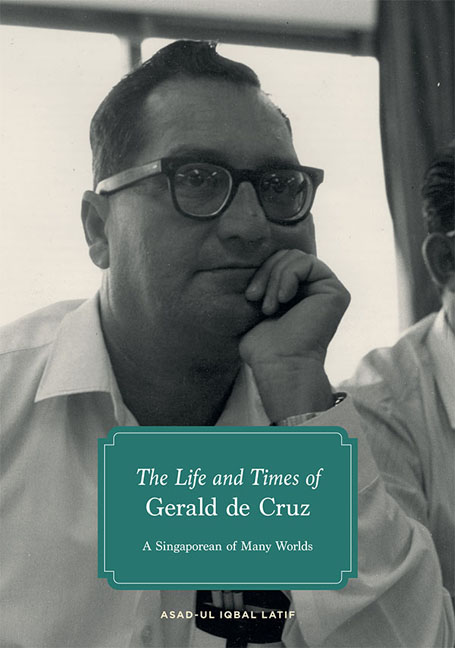Book contents
- Frontmatter
- Dedication
- Contents
- Preface
- Family Tree: Gerald Evelyn de Cruz
- 1 Don de Cruz de la Singapura
- 2 Childhood and Youth
- 3 The Japanese Occupation
- 4 The Communist Years
- 5 Going Abroad
- 6 The English Years
- 7 Return to Singapore
- 8 The Political Thinker
- 9 Friend of Labour
- 10 The Columnist
- 11 The Family Man
- Appendix
- Index
- About the Author
- Plate section
7 - Return to Singapore
Published online by Cambridge University Press: 19 May 2017
- Frontmatter
- Dedication
- Contents
- Preface
- Family Tree: Gerald Evelyn de Cruz
- 1 Don de Cruz de la Singapura
- 2 Childhood and Youth
- 3 The Japanese Occupation
- 4 The Communist Years
- 5 Going Abroad
- 6 The English Years
- 7 Return to Singapore
- 8 The Political Thinker
- 9 Friend of Labour
- 10 The Columnist
- 11 The Family Man
- Appendix
- Index
- About the Author
- Plate section
Summary
“In April 1955, David Saul Marshall, a Sephardi Jew, came into Singapore politics like a shooting star and, as in the nature of a shooting star, filled the sky with brilliance and disappeared”, Chan Heng Chee writes in her biography of Singapore's first elected Chief Minister. Although Marshall was not to preside over Singapore's transition to independence, he became a popular hero, respected for his integrity, his sympathy for the underdog, and his “abiding commitment to a democratic civic culture”. Gerald de Cruz's work with Marshall forms an essential part of his political contribution to Singapore.
On his return to Singapore, de Cruz became the Labour Front's Organizing Secretary and Secretary of its Central Committee. He was given an office in which there were thousands of applications to join the Front. They went three-quarters of the way up to the ceiling of the little room. He was asked to check them, which he duly did by rushing around Singapore trying to locate the applicants. He soon discovered that the applications were fake, with fake names, fake addresses and fake identity card numbers. They had apparently been faked by the Lim Yew Hock group to make him President of the Front. Then, he met people like Mak Pak Shee who had strong secret society connections and were open about them. Mak said to him that he had been supported all his life by secret societies. So now that he was a junior minister, the least he could do was to pay them back for all that they had done for him.
All this occurred against the wider backdrop of David Marshall's fight for complete independence for Singapore. He explained to de Cruz later that partial independence would not resolve Singapore's problems because its strong Communist underground movement and the pro-Communists leading the radical Chinese middle-school students would portray partial independence as no independence. Only real independence could placate “the anti-imperialist sentiments of the pro-Communists”. Although half a loaf is better than no bread, Marshall felt that, in the volatile situation that Singapore was in, “the bread we needed was independence, and half a loaf of independence would be no loaf at all”.
- Type
- Chapter
- Information
- The Life and Times of Gerald de CruzA Singaporean of Many Worlds, pp. 98 - 115Publisher: ISEAS–Yusof Ishak InstitutePrint publication year: 2015

